Review of Little Women (2019) – Let’s talk about that ending!
SPOILERS!
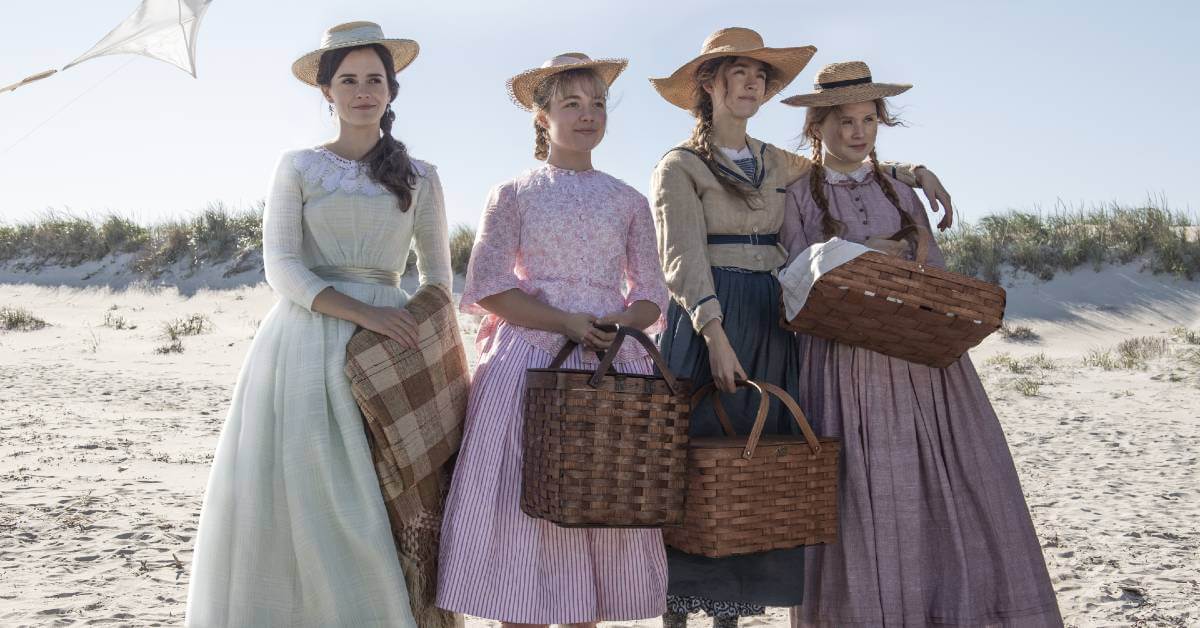
Little Women is a story from my childhood as it is for so many others. And we all have our favorite adaptations and strong opinions. Whether or not you’re Team Laurie or Bhaer, or perhaps you believe Jo, like Louisa May Alcott herself, should have ended up single, we all have something to say about it.
Furthermore, many of us despised Amy without taking the time to understand her. She’s just so hard to like! She did burn Jo’s book and stole Laurie without even a word.
Thankfully, Greta Gerwig’s brilliant screenplay and directorial vision address all the issues Alcott readers have debated for over a century. The latest Little Women feels fresh with a non-linear narrative structure and the characters real and full of humanity thanks to the writing and excellent, award-worthy performances.
By far, this is the best Little Women adaptation since the excellent 1994 film starring Winona Ryder and Christian Bale.
Little Women 2019 – The Story
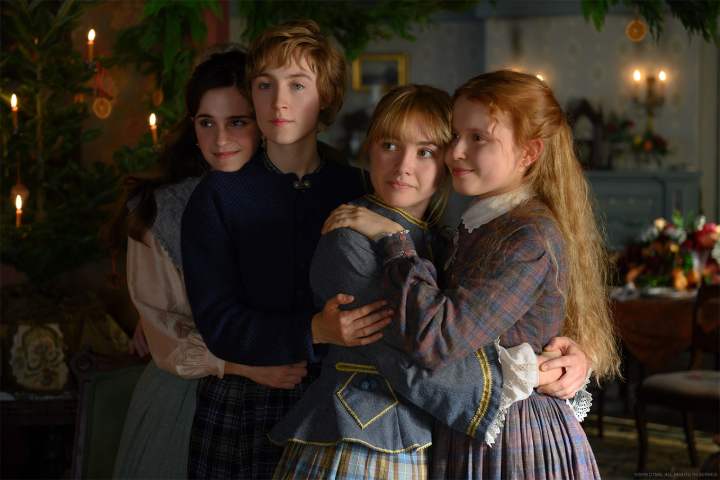
Unlike all prior Little Women movies and series, Gerwig begins in the middle with the March Sisters as adults, using flashbacks to reveal these four remarkable sisters’ beloved stories during the Civil War.
Jo March is in New York pursuing her writing career, Amy is in Europe pursuing an art career and perhaps engagement to the rich Fred Vaughn, and Meg is a homemaker with her own home, husband, and children.
Lastly, Beth, who has never quite recovered her health, remains at home with her parents. Overall, the story is undoubtedly true to the novel’s essence, even if told out of order.
RELATED | ‘LITTLE WOMEN’ 2018 FILM REVIEW – A SURPRISINGLY FAITHFUL CONTEMPORARY ADAPTATION
In the meantime, Laurie is also in Europe. He’s nursing his broken heart with alcohol and bad behavior. Jo turned him down, and Laurie’s not taking it well.
However, much to his surprise, he crosses paths with the youngest March sister, who is no longer a child and has always loved him. Amy enters just when he needs the most guidance.
As the iconic story unfolds in this unique way, we come to know all of the March sisters and their life struggles. Each of them given depth, even Amy.
Indeed, I was surprised to walk away with a new understanding and appreciation for the youngest March sister. Thanks in part to the intelligent dialogue and hugely due to Florence Pugh’s thoughtful interpretation of Amy.
Little Women 2019 – The Performances
Indeed, it’s easy to understand why Little Women has six Academy Award nominations, two for acting performances. First, Florence Pugh for supporting actress. And, second, for Saoirse Ronan (Jo March) by an actress for a leading role.
Yes, both are bright and full of heart, but the entire ensemble stands out remarkably well. From the always dynamic Meryl Streep as the miserly Aunt March, Emma Watson as the eldest sister Meg, James Norton as a sweet John Brooke, Laura Dern as our beloved Marmee, to the charismatic Timothée Chalamet as Theodore ‘Laurie’ Laurence.
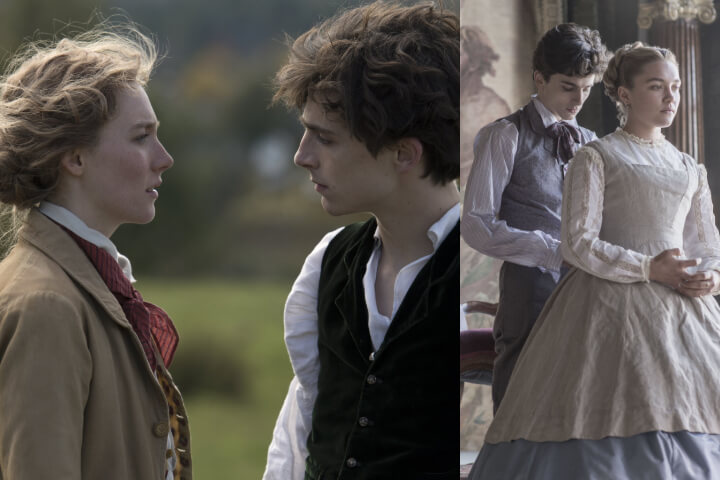
Now, I would be remiss not to mention the chemistry between Chalamet and Ronan, who previously worked together in Greta Gerwig’s Lady Bird. It’s intense, palpable, and Chalamet pulls off such passion your heart breaks with him when Jo turns him down.
However, I will concede that Chalamet also works almost equally well with Florence Pugh. Their romance, for the first time, actually works believably. At least, I didn’t want to throw things at the screen. So, improvement!
Little Women 2019 – Overall Thoughts and Spoilers
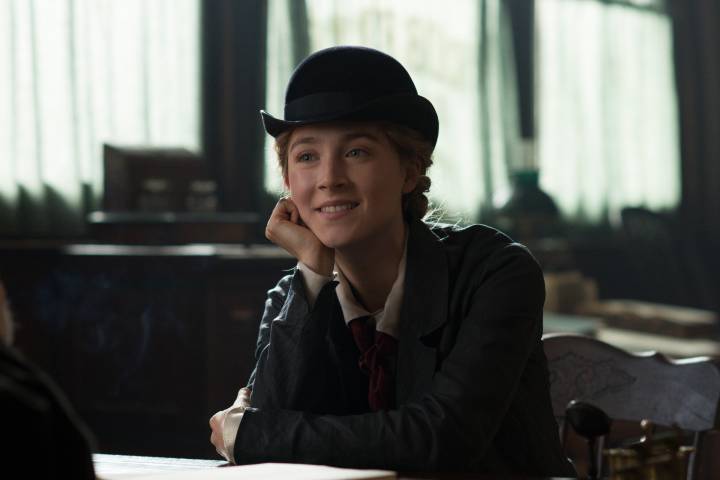
Now, the story doesn’t deviate much from Alcott’s original story. Still, Gerwig’s adaptation and vision regrettably (and even understandably) may turn off some who prefer the initial structure and order of Alcott’s novel. I, however, adored the cleverness and thoughtful precision behind Gerwig’s artistic decisions.
Where some see chaos, I see a metaphor for childhood vs. adulthood — Romanticism vs. Realism. For instance, beginning the movie with Jo in a publishing house frames a story within a story. Jo’s story. But it also emphasizes how quickly life changes from when we were children.
RELATED | LITTLE WOMEN (2018): A UNIQUE NEW ADAPTATION WITH HEART
Whereas our childhoods are full of dreams, wonder, and romantic possibilities, there are money issues, loneliness, and death as adults. In particular, the sisters drift apart to their own lives.
Therefore, when Beth dies, we feel the loss even more deeply. How sad reality and the trials of living compared to the pleasant childhood memories of the past where Beth lived the first time around.
To Marry or Not to Marry
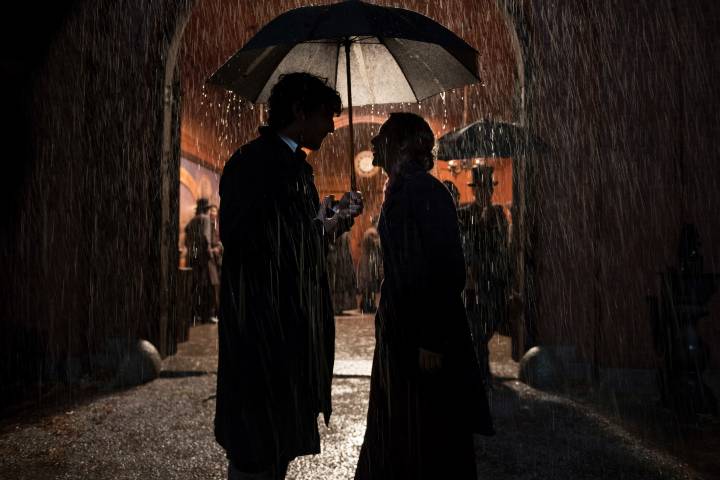
“And if the main character’s a girl make sure she’s married by the end.”
– Jo’s Publisher, Mr. Dashwood
On a side note, I must also talk about that ambiguous ‘fictional’ ending in the 2019 Little Women adaptation. In the end, did Jo marry the undeveloped yet handsome version of Friedrich Bhaer to end her loneliness?
Did she genuinely achieve a romantic comedy ending? Or, was this merely staged in Jo’s novel to please her editor, who believed all female characters needed to end up married?
“If I’m going to sell my heroine into marriage for money, I might as well get some of it.”
– Jo March
The ending’s subtext and dreaminess suggest the latter (the theme is money over art, after all), but it remains a mystery and opens to interpretation. For me, the fiction frames the movie nicely by emphasizing Jo’s independence as a female writer who not only fought for copyright but won.
For sure, this is also a subtle nod to Louisa May Alcott herself, who smartly achieved the same deal and wrote in Bhaer to please her editor.
RELATED | 50 BOOKS TO READ IF YOU LOVE JANE AUSTEN
Overall, while I feel the 1994 film is the truest to the original novel, the latest film is the truest to Louisa May Alcott. Not only did Gerwig film in the real Concord, but she created the ending I believe Alcott always desired. I find that beautiful.
Little Women (2019) is an excellent film that deserves all the awards coming its’ way. From the outstanding costumes, memorable performances, to the stunning cinematography, the latest Little Women is one of the best films of 2019.
Where to Watch: Starz, Starz Amazon Channel. You can also buy it on Digital and DVD.
Content Note: PG
What are your thoughts on the latest Little Women? What do you think about the ambiguous ending? Sound off below…
(Photos: Sony Pictures and Columbia)

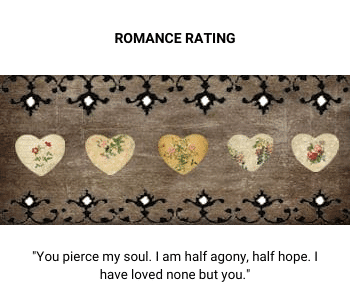
PIN THIS ARTICLE! AND MAKE SURE TO FOLLOW US ON PINTEREST.
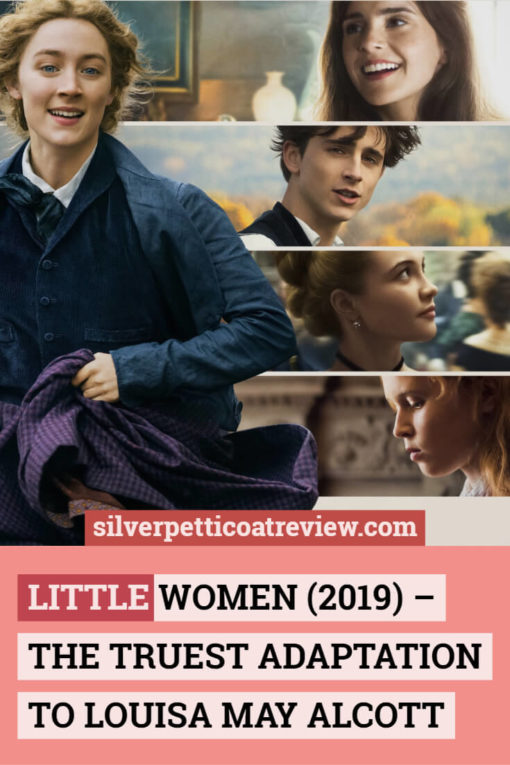

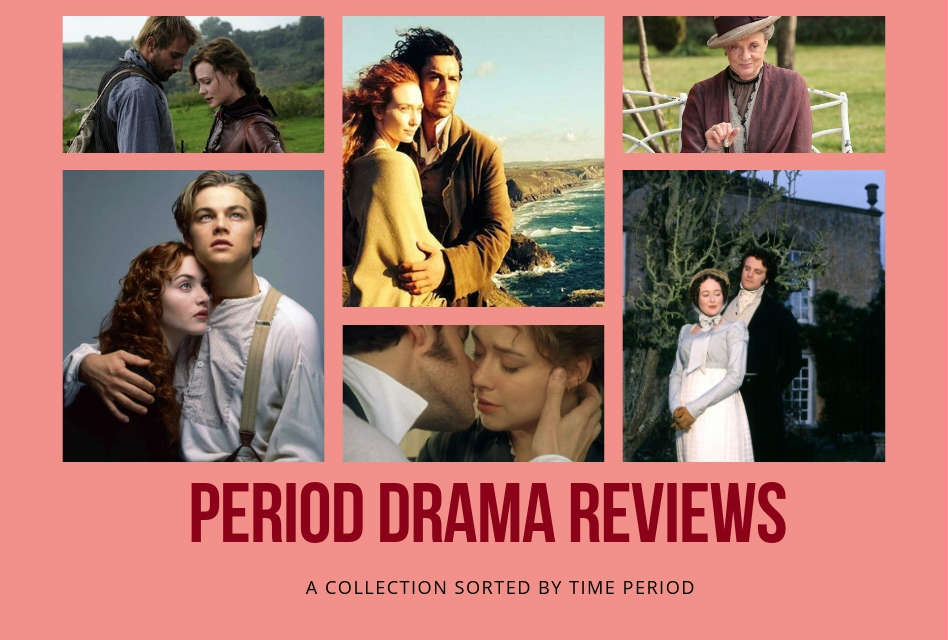
I really enjoyed this unique approach to Alcott’s beloved story. I finally read the book last year and felt that no one had yet truly portrayed Meg and Amy’s stories well. This film does much toward focusing more on all four of the March sisters instead of revolving around Jo, with the others as peripheral characters. It’s the first film adaptation I’ve seen that doesn’t portray Amy in a one-dimensional way, but instead shows her as a whole person.
Watching the films, I’ve always felt that Jo and Laurie belonged together, but after reading the book, I realized that Jo never had romantic interest in Laurie as prior movies tried to portray. These adaptations also left out the majority of the development of Amy and Laurie’s relationship so that it never felt true. I loved that Gerwig gave us more glimpses of these two together so their eventual marriage makes sense.
After reading the book, I felt that John Brooke is one of the most romantic and underrated heroes ever written, so I’m glad to see he got more attention in this adaptation, although I still don’t feel his essence was truly captured.
While I think every adaptation has its’ own charm, this one just may be my new favorite.
Amy was, is and always will be the worst and truly evil character in the history of literature. Everyone who has read the book or seen any of the prior adaptations knows this to be true. Where were the armies of Amy apologists demanding a re-write to redeem her? If she were real and alive today she’d be voting for Trump and eating calico kittens for afternoon tea. Probably would be an anti-vaxxer too. I mean, probably.
“Florence Pugh’s thoughtful interpretation of Amy” – Fie, I say. She is a talented actress, I grant you, but her complicity in this dastardly and pernicious plot to redeem Amy must be called out. Just say no! Amy shall not pass.
*SPOILERS* I’ve seen many reviews that are over the moon for this adaptation of Little Women. But, having read the book just before watching this version, I have to say my opinions of the movie are much more tepid. I have no issue with the creative way Gerwig worked the timeline, but so many things felt so off from the original characters. For example, in the book, Jo develops as a person, first on accepting that Beth WILL die and making peace with it, and then in caring for Beth so intimately as she is failing. In the movie, Jo whispers to Beth as she is dying, that she wants her to fight and never stop fighting. It basically took the idea that Beth made everyone around her better, one of the beautiful things about her, and dumps it off to the side, IMO. There are many more examples I can think of (Professor Bhaer is now a hot French man?!), but that is my general feeling for the 2019 adaptation. Beautiful, creative, but also lacking for what I wanted it to be.
Anyone else notice the similarities in the dialogues between Jo and Laurie vs. Anne and Gilbert in the Anne of Avonlea miniseries? When Gilbert “proposes” to Anne, very similar.
This is such an American story. Almost stereotypical to someone who lives elsewhere (like me). To have the March sisters played by two English actresses, one Irish actress and an Australian tickled my funny bone. They certainly pulled it off.